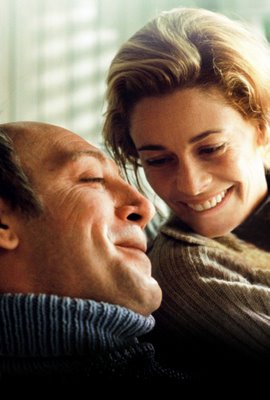
Nathars from Ireland writes..
A work of cinematic brilliance. Will be difficult viewing for many, especially non-Irish I think. It is/will be controversial for political but not for cinematic reasons. It is beautifully crafted and the performances are straight out of the top drawer. Damien and the train driver are very powerfully played, Sinead is a typical young Irishwoman in the drama and is brilliantly portrayed in muted but vital terms. Ken Loach's direction is magnificent and though I do not share his political ideologies, I commend his insights and his talent.
There are huge factual truths behind this film in that it is based around typical events of that period but I do not accept the blatant "baddienss" of the English portrayed here. They were more subtle and humane in many cases and much worse in others. They were just an out of control paramilitary force in a so-called democracy. For people who are not of my age (55) and not from Ireland, this film probes deep into the heart of the simple times (no running water, no electricity, no telephones, very few automobiles etc.). I felt memories of living in rural Ireland in my early youth in these circumstances, and the emotional memories of uncles and aunts and idyllic childhood summers came flooding through and are still with me as I write this piece.
I feel violated in a very good sense of that word by this film, it burrowed in under my skin and probed my mind like no other piece of cinema has ever done before. I could critique lots of little things but the greatest canvas has a few flaws because it was painted by a man.
This movie is simply the best and in its contrast to the standard Hollywood blockbuster it stands out as extraordinary. Cillian Murphy must be an Oscar contender if the US distributes this film. The jury at Cannes was not wrong, and if Denzel Washington was part of the unanimous vote for the Palm D'Or then maybe there is a market in the US for this one. It might be a slow burner instead of a box-office extravaganza. That is this film's tradegy and Hollywood's triumph of mediocrity over genius. Tinsel rubbish can sell if packaged properly, and greatness can languish for years before being recognised (a la Van Gough). Take your Palme D'Or Mr. Loach & Co. you deserve this much recognition and the grateful thanks of a "middle-class" Irishman who came from humble beginnings. I hope I have not forgotten.
An editorial from a Cork newspaper sums it up well:
This wind shakes more than barley
There is no question that this film makes the British forces look bad, but of course the reality as all Irish people know is that they were. In the UK normally reasonable and intelligent reviewers and commentators cannot cope with this depiction of occupying British forces as violent repressors of a largely defenceless native population. It has been described as unbalanced and portraying the valiant British soldiers in an unfair and unflattering light. The truth is that the vast majority of British citizens couldn't tell you where Galway is and why should they? They're ignorance of their own colonial past so close to home and denial of it shouldn't surprise us; it is not something to be proud of.
This is not to attack Britain, but to remind Irish readers of UK newspapers and viewers of UK television that Britain is indeed a foreign country. They view the world through an entirely different perspective than us, and in truth our views are inconsequential to them. That's why Loach's film, which tells essential truths, will not get a general release in the UK. Despite the fact that Anglo-Irish relations are probably better now than they have ever been the truth about Britain's history in Ireland is something that they just aren't ready for, and probably never will be.
